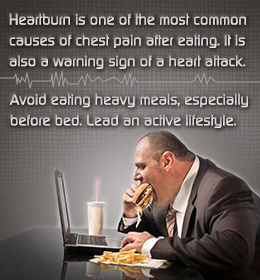If your chest pains after eating then it is time you reviewed your daily diet, and more importantly, your eating habits. More often that not, it is an unhealthy eating habit that causes such problems.

Chest pain is often described as any pain, choking, pressure or other discomfort that is felt in the chest, neck or upper abdominal region. Often chest pain is associated with heart diseases. Did you know that heartburn can also be a warning sign of a heart attack? However, it may have non-cardiac causes too. The following section throws some light on the most common causes of chest pain post eating.
Why Does Your Chest Pain After Eating?
If the acidic fluid from stomach is carried back into the esophagus, it leads to heartburn. Heartburn causes a burning discomfort in the area just below the breastbone. It might also lead to problems like bloating and gas. Heartburn is the common symptom of gastroesophageal reflux disease (GERD) and it's also one of the primary causes of chest pain after eating. If you repeatedly experience heartburn after meals, you possibly have gastroesophageal reflux disease. Burning sensation in the throat or a sour or bitter taste in mouth is also experienced in this case. When stomach contents reflux up into esophagus, they might also reach the back of throat causing a sour and bitter taste in mouth. Nausea after eating is often caused due to the same reason.
Ulcers can be another major cause of pain in your chest soon after eating. Ulcers are open wounds which develop in the lining of digestive tract due to bacterial infection. As the condition develops, lining of digestive system erodes and the food you eat aggravates the damaged lining, causing pain. A proper course of treatment needs to be taken from your doctor so as to cure this problem.
Sometimes you might experience difficulty in swallowing food. It happens when food does not pass from your mouth through esophagus to the stomach. This is usually caused due to extreme indigestion. Let me tell you that overeating often leads to indigestion which is one of the basic causes of chest pain. These symptoms can increase after consuming tobacco or caffeine. Overeating leads to indigestion, gas and fatigue as well. Fatigue after eating is a reaction to certain food items like sweets, bakery items, foods high in flour.
Inflammation of the stomach lining leads to gastritis. This inflammation is most probably caused due to dietary irregularity, overeating and regular intake of junk food. Excessive intake of oily food, tea, coffee, alcohol and stress are some other causes of gastritis which leads to chest pain. Dizziness after eating is also commonly caused due to gastritis.
What Can Be Done?
☞ Avoiding chocolate, peppermint, fatty foods, coffee, and alcoholic beverages will help in reducing this problem.
☞ Citrus fruits and juices, tomato products irritate and damage the esophageal lining, so these should be strictly avoided.
☞ Eating 3-4 small meals and reducing the amount of food intake is important.
☞ Proper hydration is very essential to cure digestion related problems, hence, drinking 7-8 glasses of water daily is a must.
☞ Eating food at least 2 hours before you go to bed is recommended to solve the problem of chest pain at night.
☞ A small walk after eating is very beneficial for proper digestion.
Following a healthy diet plan and having breakfast, lunch and dinner on time should help resolve common causes of chest pain after having food. Make sure that you get yourself examined from a reputed doctor in case of repeated chest pain to know the exact cause. Ignorance can lead to development of serious health problem. Take care!
Disclaimer:
The information provided in this article is solely for educating the reader. It is not intended to be a substitute for the advice of a medical expert.


 Chest pain is often described as any pain, choking, pressure or other discomfort that is felt in the chest, neck or upper abdominal region. Often chest pain is associated with heart diseases. Did you know that heartburn can also be a warning sign of a heart attack? However, it may have non-cardiac causes too. The following section throws some light on the most common causes of chest pain post eating.
Chest pain is often described as any pain, choking, pressure or other discomfort that is felt in the chest, neck or upper abdominal region. Often chest pain is associated with heart diseases. Did you know that heartburn can also be a warning sign of a heart attack? However, it may have non-cardiac causes too. The following section throws some light on the most common causes of chest pain post eating.